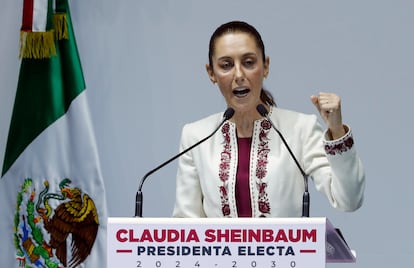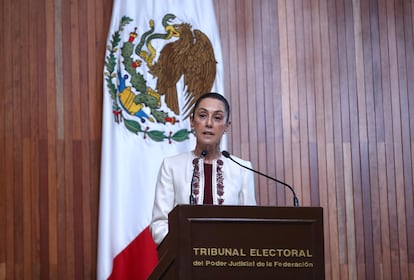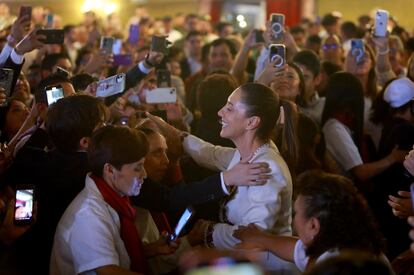Mexico’s Claudia Sheinbaum prepares to take power
The two months since she won the Mexican elections with a landslide victory have given her increasing protagonism as she picks her Cabinet and sets guidelines for government


In politics, some things are revealed gradually and others suddenly become clear when the official precepts are fulfilled. Claudia Sheinbaum’s trajectory is an example of how someone becomes empowered. After winning a landslide victory in June’s presidential elections, she was officially recognized as Mexico’s president-elect on August 15 and sent an unequivocal message to the magistrates, leaving them in no doubt that the majority achieved by her party and allies in the elections should be respected.
Minutes later, before hundreds of her supporters, she said: “I suggest that the party convene a congress in September to elect the leadership and update this new process of transformation… our bylaws, and a clear route that separates the work of the government from that of the party.” She was speaking, she said, not as the leader of Morena, the National Regeneration Movement — but as the president of all Mexicans. The former mayor of Mexico City was never so much a boss as in that moment.
The president-elect’s latest political maneuvers have been undertaken with President Andrés Manuel López Obrador very much at her side. There has been no rally in which she did not mention his work, promise to continue it and reject any betrayal of his legacy. In recent days, she has been travelling with him through different Mexican states, once again visiting the people and following López Obrador’s dictate: that you have to be down with the people, and not disappear into the palace.
Her continuing closeness to López Obrador has attracted its share of criticism. She has been dubbed a follower — someone who cannot let go of the leader’s hand. Indeed, someone who will govern according to López Obrador’s criteria. There was speculation that this would reduce her votes in the election, and her landslide victory came as a surprise, even for Morena. She won more than 59% of the vote, a higher percentage than the figure that propelled López Obrador to power in 2018, leaving her adversary 32 points behind. Given this lead, the perception that she is not forging her own path has been a source of discontent.
But Sheinbaum’s statesmanship has been building since the elections. Aware that during the interim period between the election result and her swearing in on October 1, no one pays attention to the outgoing president, Sheinbaum, immediately went out to calm the markets, whose fears of anti-market reforms sunk the peso. She promptly declared her intention to leave the Secretary of Finance, Rogelio Ramírez de la O, in his post, and held talks with the International Monetary Fund, the World Bank, the OECD and the powerful investment fund BlackRock.

She then began to present her Cabinet, though she has yet to appoint the Secretary of National Defense and the Secretary of the Navy, and fill other high-profile positions, such as the head of the national oil company, Pemex. This piecemeal approach has kept the media hooked, even as her daily conferences have seemed to lose steam. And while she has opted for continuity in policies, she has also surrounded herself with her own former collaborators and has made her mark on issues such as academia and science, a sector she herself comes from. Indeed, Sheinbaum may have attracted voters from this sector, who would not have backed another López Obrador term.
The enlightened middle classes have welcomed the fact that the former National Council of Humanities, Science and Technology, which were so undermined during López Obrador’s government, have been turned into a secretariat to be headed by UNAM biologist and academic Rosaura Ruiz, who worked with Sheinbaum in Mexico City’s local government. Others, such as the new Foreign Secretary, Juan Ramón de la Fuente, also hails from UNAM.
Another of the former Mexico City mayor’s moves has been to find a place for Omar García Harfuch, who she previously put forward without success for the role of Mexico City mayor. She has also managed to orchestrate the return of Lázaro Cárdenas Batel, a friend of the president’s and now one of her most trusted Cabinet members. Cárdenas Batel was previously a Cabinet coordinator but resigned in March last year after public disagreements between López Obrador and Lázaro Cárdenas Batel’s engineer father, Cuauhtémoc Cárdenas.
At the beginning of August, the state governors met with Sheinbaum to discuss common policies and present requests for work on various issues such as water, roads, electricity and containing crime. Not all of these governors are from Sheinbaum’s party, but those who are not are in the minority. Sheinbaum received the governor of Nuevo León, Samuel García, to discuss the issue of Tesla, and the electric car plant that the magnate Elon Musk promised to locate in this state, which is still to be confirmed. García believes things will settle after the U.S. elections. Nuevo León is a prosperous state and central to the president’s interests. López Obrador made sure he took it into account, and now photographs have emerged of a beaming Sheinbaum with García and his wife, Mariana Rodríguez Cantú.
Smiles are part of presidential diplomacy. As are snubs. And it was telling that the Morena party’s ally, Gerardo Fernández Noroña from the Labor Party, was the only figure who Sheinbaum failed to kiss at the gathering on August 15. Noroña claims a post, as promised to those who fought for Sheinbaum’s presidency. But now everyone has been appointed bar him, and, true to form, he has not disguised his disgruntlement.

On August 15, Sheinbaum laid out her government’s priorities, which run along the same lines as those of López Obrador’s administration: a moral economy, support for the poor, social welfare programs, educational scholarships, independence and sovereignty. Between one thing and another, she mentioned all the Mexican left-wing bigwigs, from Juárez to Cárdenas, throwing in a handful of women who are not always mentioned, and some feminist policies for good measure.
But if anyone expects her to branch out on her own and leave López Obrador behind, they might be disappointed: “Our adversaries get upset when I talk about López Obrador, they want a disassociation, but I am not going to do it. It is an honor to be with Obrador. He is the best president Mexico has ever had,” she said.
Sign up for our weekly newsletter to get more English-language news coverage from EL PAÍS USA Edition
Tu suscripción se está usando en otro dispositivo
¿Quieres añadir otro usuario a tu suscripción?
Si continúas leyendo en este dispositivo, no se podrá leer en el otro.
FlechaTu suscripción se está usando en otro dispositivo y solo puedes acceder a EL PAÍS desde un dispositivo a la vez.
Si quieres compartir tu cuenta, cambia tu suscripción a la modalidad Premium, así podrás añadir otro usuario. Cada uno accederá con su propia cuenta de email, lo que os permitirá personalizar vuestra experiencia en EL PAÍS.
¿Tienes una suscripción de empresa? Accede aquí para contratar más cuentas.
En el caso de no saber quién está usando tu cuenta, te recomendamos cambiar tu contraseña aquí.
Si decides continuar compartiendo tu cuenta, este mensaje se mostrará en tu dispositivo y en el de la otra persona que está usando tu cuenta de forma indefinida, afectando a tu experiencia de lectura. Puedes consultar aquí los términos y condiciones de la suscripción digital.








































